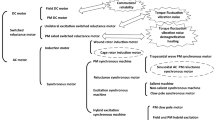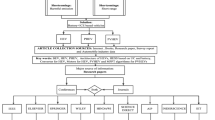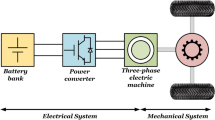Abstract
This research develops a typical model for a parallel hybrid electric vehicle. Model predictive controllers and simulations for this model have been built to verify the ability of the system to control the speeds and to handle the transitional period for the clutch engagement from the pure electrical driving to the hybrid driving. If the output constraints are the measured speeds and the unmeasured torques which are not strictly imposed and can be violated somewhat during the clutch engagements, a modified model predictive controller with soften output constraints has been developed. Simulations show that the new model predictive controller can control the speeds very well for rapid clutch engagements, which enhance the driving comfort and reduce the jerk on the parallel hybrid electric vehicles.
Similar content being viewed by others
References
R. Langari and J. S. Won, “A driving situation awareness-based energy management strategy for parallel hybrid vehicles,” Proc. Future Transportation Technology Conference, California, vol. 1, pp. 95–102, 2003.
R. van der Graaf, D. B. Kok, and E. Spijker, “Integration of drive system, subsystems and auxiliary systems of a flywheel hybrid driveline with respect to design aspects and fuel economy,” Hybridantriebe: Tagung Garching, VDI-Verlag, Düsseldorf, vol. 1, pp. 459–467, 1999.
S. M. Lukic and A. Emadi, “Effects of drivetrain hybridization on fuel economy and dynamic performance of parallel hybrid electric vehicles,” IEEE Trans. on Vehicular Technology, vol. 53, no. 2, pp. 385–389, 2004.
N. Jalil, N. A. Kheir, and M. Salman, “A rule-based energy management strategy for a series hybrid vehicle,” Proc. American Control Conference, Albuquerque, vol. 1, pp. 689–693, 1997.
N. J. Schouten, M. A. Salman, and N. A. Kheir, “Fuzzy logic control for parallel hybrid vehicles,” IEEE Trans. on Control Systems Technology, vol. 10, no. 3, pp. 460–468, 2002.
T. S. Kim, C. Manzie, and R. Sharma, “Model predictive control of velocity and torque split in a parallel hybrid vehicle,” Proc. IEEE International Conference on Systems, San Antonio, vol. 13, no. 2, pp. 2014–2019, 2009.
G. Paganelli, S. Delprat, T. M. Guerra, J. Rimaux, and J. J. Santin, “Equivalent consumption minimization strategy for parallel hybrid powertrains,” Proc. IEEE Vehicular Technology Conference, Columbus, vol. 4, pp. 2076–2081, 2002.
A. Sciarretta, M. Back, and L. Guzzella, “Optimal control of parallelhybrid electric vehicles,” IEEE Trans. on Control Systems Technology, vol. 12, no. 3, pp. 352–363, 2004.
S. J. Qin and T. J. Badgwell, “An overview of industrial model predictive control technology,” AIChE Symposium Series, vol. 316, pp. 232 256, 1997.
R. Findeisen, Z. Diehl, F. Nagy, H. Allgower, and J. Schloder, “Computational feasibility and performance of nonlinear model predictive control schemes,” Proc. International Conference on Chemical Process Control, Arizona, vol. 1, pp. 454–460, 2001.
J. Rawlings, “Tutorial overview of model predictive control,” IEEE Contr. Syst. Mag., vol. 20, no. 3, pp. 38–62, 2000.
M. Morari and J. Lee, “Model predictive control: past, present and future,” Comput. Chem. Eng., vol. 23, no. 4, pp. 667–682, 1999.
D. Mayne and H. Michalska, “Robust receding horizon control of constrained nonlinear systems,” Proc. IEEE Conference on Decision and Control, vol. 38, pp. 1623–1633, 1993.
H. Chen and F. Allgower, Nonlinear Model Predictive Control Schemes with Guaranteed Stability, Kluwer Academic Publishers, New York, 1998.
V. T. Minh and N. Afzulpurkar, “A comparative study on computational schemes for nonlinear model predictive control,” Asian Journal of Control, vol. 8, no. 4, pp. 324–331, 2006.
V. T. Minh and N. Afzulpurkar, “Robust model predictive control for input saturated and soften state constraints,” Asian Journal of Control, vol. 7, no. 3, pp. 323–329, 2005.
V. T. Minh and N. Afzulpurkar, “Robustness of model predictive control for ill-conditioned distillation process,” International Journal of Developments in Chemical Engineering and Mineral Processing, vol. 13, no. 3/4, pp. 331–316, 2005.
J. Fredriksson and B. Egbert, “nonlinear control applied to gearshifting in automated manual transmissions,” Proc. IEEE Conference on Decision and Control, Sydney, vol. 1, pp. 444–449, 2000.
B. K. Powell, K. E. Bailey, and S. R. Cikanek, “Dynamic modelling and control of hybrid electric vehicle powertrain systems,” IEEE Control Systems Magazine, vol. 18, no. 5, pp. 17–33, 1998.
V. T. Minh, N. Afzulpurkar, and W. Muhamad, “Fault detection and control of process systems,” Mathematical Problems in Engineering, vol. 2007, Article ID 80321, 20 pages, 2007.
A. Sciaretta and L. Guzzella, “Control of hybrid electric vehicles,” IEEE Control Systems Magazine, vol. 27, no. 2, pp. 60–70, 2007.
G. Ripaccioli, D. Bernardini, S. Di Cairano, A. Bemporad, and V. Kolmanovsky, “A stochastic model predictive control approach for series hybrid electric vehicle power management,” Proc. American Control Conference, Baltimore, vol. 1, pp. 5844–5849, 2010.
D. H. Ji, J. H. Park, W. J. Yoo, and S. C. Won, “Robust memory state feedback model predictive control for discrete-time uncertain state delayed systems,” Applied Mathematics and Computation, vol. 215, no. 6, pp. 2035–2044, 2009.
S. M. Lee, S. C. Won, and J. H. Park, “A new robust model predictive control for uncertain systems with input constraints using relaxation matrices,” Journal of Optimization Theory and Application, vol. 138, no. 2, pp. 221–234, 2008.
Author information
Authors and Affiliations
Corresponding author
Additional information
Recommended by Editorial Board member Ju Hyun Park under the direction of Editor Young Il Lee.
This research was supported by Papua New Guinea University of Technology (UNITECH) Papua New Guinea.
Vu Trieu Minh is a visiting professor at the Department of Mechanical Engineering, Papua New Guinea University of Technology (UNITECH), Papua New Guinea. He obtained his B.E of Mechanical from Hanoi University of Technology (HUT) in 1983, an M.E. of Industrial System Engineering and a Ph.D. of Mechatronics from Asian Institute of Technology (AIT) in 1999 and 2004, respectively. He has previously worked in Vietnam, Thailand, Germany, Malaysia, and Papua New Guinea. He has authored over thirty research papers and textbooks in the fields of model-based control algorithms, dynamical systems, advanced process control, and automotive engineering. He is a senior member of IEEE/CSS.
John Pumwa is a professor and the head of Department of Mechanical Engineering, Papua New Guinea University of Technology (UNITECH), Papua New Guinwa. He obtained his B.E. in Mechanical Engineering from the PNG University of Technology (Unitech) in 1981, an MEng (Hons) in Mechanical Engineering from the University of Wollongong, N.S.W., Australia in 1991 and a Ph.D. in Interdisciplinary Engineering from Texas A&M University (TAMU), College Station, Texas, USA in 1997. He has been employed internationally by various learning institutions in Taejon, South Korea, Waco, Texas and Papua New Guinea. He has authored more than 25 conference and journal papers in the fields of engineering materials and dynamics. He is a Fellow of the American Society of Mechanical Engineers (ASME) and the Institution of Engineers Papua New Guinea. He is also a Chartered member and the country representative for the Institution of Mechanical Engineers (IMechE) UK.
Rights and permissions
About this article
Cite this article
Minh, V.T., Pumwa, J. Simulation and control of hybrid electric vehicles. Int. J. Control Autom. Syst. 10, 308–316 (2012). https://doi.org/10.1007/s12555-012-0211-1
Received:
Revised:
Accepted:
Published:
Issue Date:
DOI: https://doi.org/10.1007/s12555-012-0211-1




